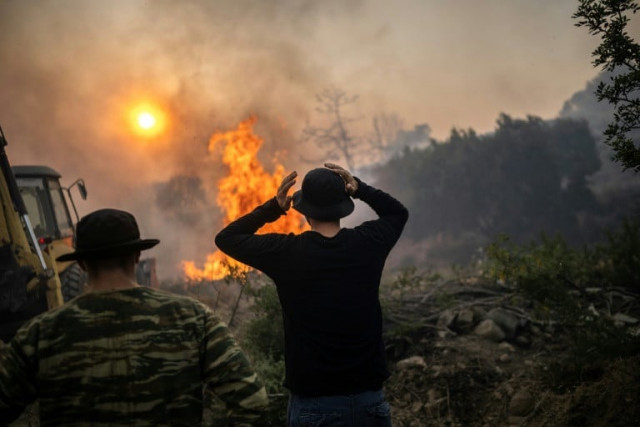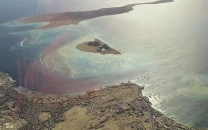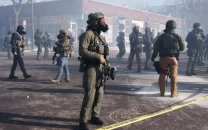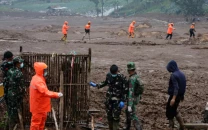Cyprus battles large wildfire

Aircraft from Greece and Jordan were helping Cypriot authorities battle a large wildfire in the southwestern Paphos region believed to have been started by an illegal landfill, officials said Wednesday.
The fire broke out Tuesday east of the village of Giolou, triggering a national emergency plan that saw civil defence evacuate five mountain villages at risk.
Officials said two air tractors from the Royal Jordanian Air Force and two planes from Greece were deployed Wednesday to tackle the blaze in the rugged terrain.
Fire service spokesman Adreas Kettis said later on Wednesday that the fire was subsiding.
“The fire is now subsiding. The active front near the Polemi community has been controlled,” he wrote on X.
“Suppression teams continue with final extinguishing efforts and complete containment. The risk of rekindling remains present.”
Nicosia had activated the European Union fire assistance protocol to seek help in containing the fire.
Fire service chief Nicos Logginos told state radio Wednesday that seven aircraft, including two Canadair planes from Greece, are operating over the active fronts.
He said that due to harsh terrain, ground forces have been unable to reach the area.
Over 300 people, including fire crews, supported by bulldozers, were working to secure the perimeter of the fire.
Logginos said police have evidence the fire started from an illegal landfill site.
Around 48 people evacuated from the fire zone were taken to hotels, said local daily Kathimerini Cyprus.
The scale of the fire prompted President Nikos Christodoulides to return early from a Gaza aid summit in Jordan on Tuesday to visit the crisis control centre.
During a meeting with King Abdullah II of Jordan, he requested additional aerial support to combat the fire in Paphos.
Kettis said earlier that a number of homes suffered extensive damage or were destroyed, but the scale of the destruction had yet to be determined.
Residents have complained that homes were destroyed because of the slow response to the fire’s outbreak.
The community leader in the village of Lemona, Kyriakos Charalambous, told the Cyprus News Agency it took “too long” for aerial firefighting units to arrive.
Wildfires often erupt in Cyprus during the sweltering summer months on the island which suffers from a severe lack of rainfall.
The Department of Meteorology issued a yellow alert for Wednesday for extreme heat, with maximum temperatures expected to reach 41 degrees Celsius.



















COMMENTS
Comments are moderated and generally will be posted if they are on-topic and not abusive.
For more information, please see our Comments FAQ